

Russia's President Vladimir Putin says his country will continue its yearlong "special military operation" in Ukraine, and he accused the US-led NATO alliance of fanning the flames.
Russia-Ukraine conflict would have cost world economy $1.6 trillion in 2022, according to a study published by the German Economic Institute.
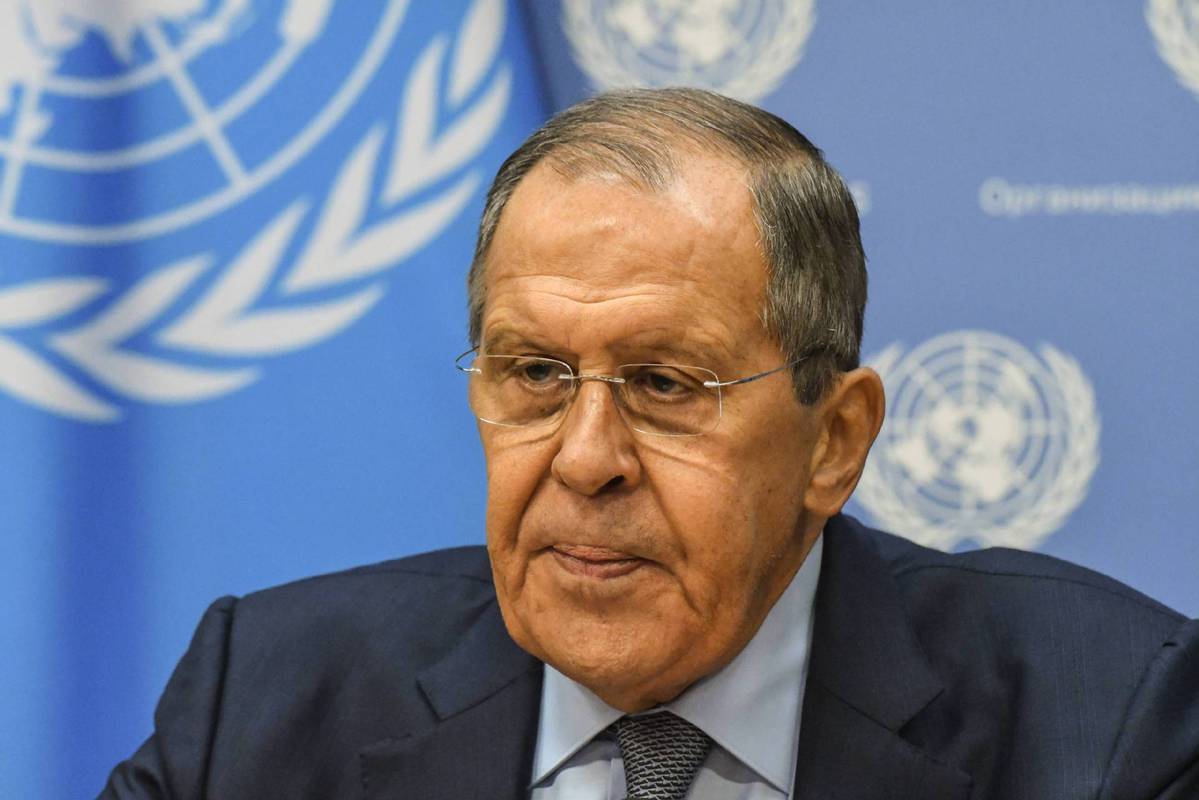
Washington's hand cited by Lavrov, who says Moscow open to peace talks
Russian Foreign Minister Sergey Lavrov said on Tuesday that the United States has long been involved in the conflict in Ukraine.
The US has for a long time been participating de facto in the conflict that is "being controlled by the Anglo-Saxons", Lavrov told Russian state television.
Lavrov said that officials including White House national security spokesman John Kirby had said the US was open to talks but that Russia had refused.
"This is a lie," Lavrov said. "We have not received any serious offers to make contact."
Russia will not turn down a meeting between President Vladimir Putin and US President Joe Biden at a forthcoming G20 meeting and would consider the proposal if it receives one, Lavrov said.
Russia was willing to listen to any suggestions regarding peace talks, but that he could not say in advance what this process will lead to, he added.
Russia will respond to the West's growing involvement in the Ukraine conflict although direct conflict with NATO is not in Moscow's interests, Russia's deputy foreign minister said on Tuesday after Washington pledged more military aid for Kyiv.
"We warn and hope that they realize the danger of uncontrolled escalation in Washington and other Western capitals," Sergey Ryabkov was quoted as saying by the RIA news agency on Tuesday.
Ukraine on Monday said it needed to strengthen its air defense following Russia's retaliation for an attack on a strategic bridge in Crimea.
Biden promised to provide advanced air defense systems, and the Pentagon said on Sept 27 it would start delivering the National Advanced Surface-to-Air Missile System over the next two months or so.
Biden and the Group of Seven leaders held a virtual meeting on Tuesday to discuss their commitment to support Ukraine.
Putin said he ordered "massive" long-range strikes after accusing Ukraine of an attack on the bridge in Crimea on Saturday.
Ukrainian President Volodymyr Zelensky spoke to Biden on Monday and wrote on Telegram that air defense was the "number 1 priority in our defense cooperation".
Russia's ambassador to the US, Anatoly Antonov, said more Western help for Ukraine raised the risk of a wider conflict.
Risks increased
"Such assistance, as well as providing Kyiv with intelligence, instructors and combat guidelines, leads to further escalation and increased the risks of a clash between Russia and NATO," Antonov told media.
Ukrainian news portal Strana reported on Tuesday the emergency messages read that explosions were highly likely during the day. Residents were being alerted to stay in shelters and not to ignore air alert notifications.
The Russian Foreign Ministry said on Monday that Washington's encouragement of Ukraine's "bellicose mood" complicates diplomatic efforts to solve the conflict, and it warned of countermeasures against the US and Europe over their involvement.
"We repeat once again specially for the American side: the tasks that we set in Ukraine will be solved," Foreign Ministry spokeswoman Maria Zakharova wrote on the ministry's website.
"Russia is open for diplomacy and the conditions are well known. The longer Washington encourages Kyiv's bellicose mood and encourages rather than hinders the terrorist undertakings of Ukrainian saboteurs, the more difficult will be the search for diplomatic solutions."
Chinese Foreign Ministry spokeswoman Mao Ning told a regular news briefing on Tuesday that China maintains communication with all parties, and the country is ready to play a constructive part in de-escalation efforts.
It is important for all parties to engage in dialogue for the de-escalation of the situation, she said.
Turkiye on Tuesday called for a viable cease-fire between Russia and Ukraine as soon as possible, saying that both sides were moving away from diplomacy as the conflict dragged on.
"A cease-fire must be established as soon as possible. The sooner the better," Turkish Foreign Minister Mevlut Cavusoglu said in an interview.
"Unfortunately (both sides) have quickly moved away from diplomacy" since talks between Russian and Ukrainian negotiators in Istanbul in March, Cavusoglu said.
Agencies contributed to this story
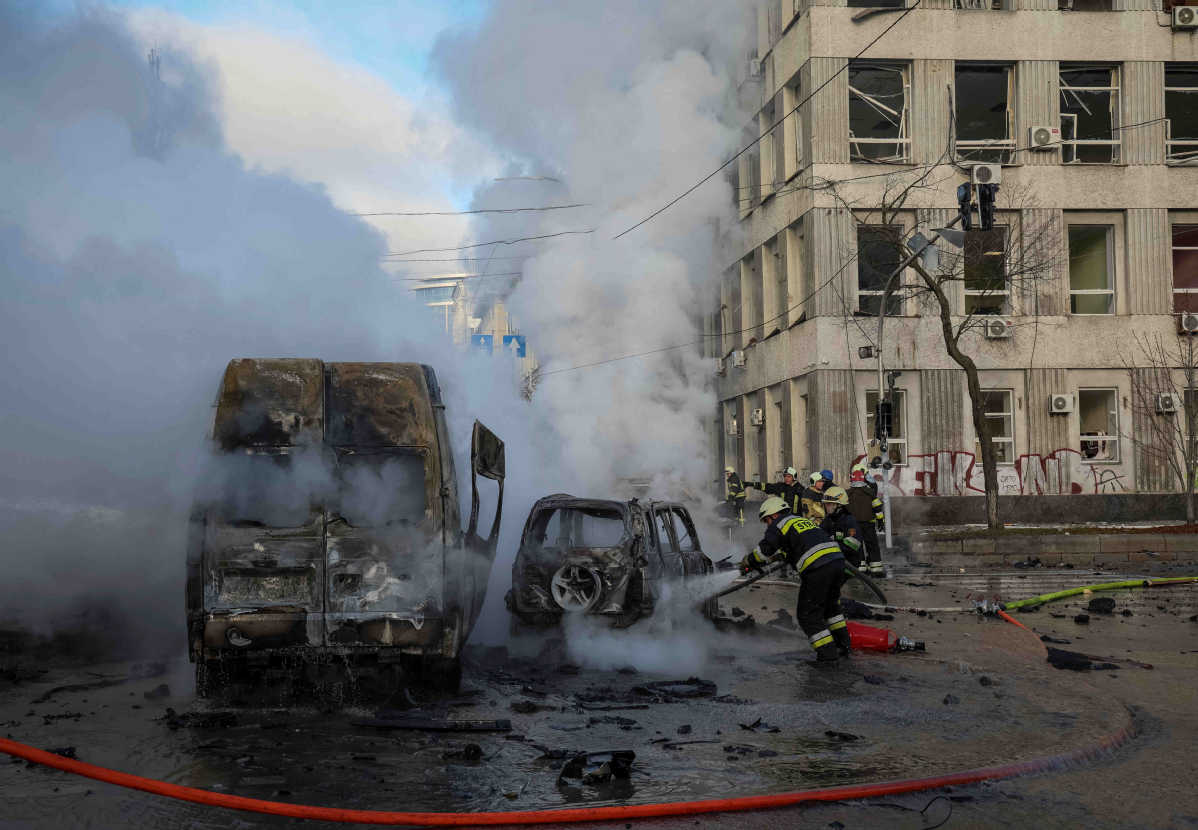
Russian President Vladimir Putin warned Ukraine on Monday that there would be a harsh response if there were any further attacks such as that on the Crimean Bridge.
"If attempts to carry out terrorist attacks on our territory continue, Russia's responses will be harsh and, in terms of their scale, will correspond to the level of threats posed to the Russian Federation. No one should have any doubts about this," Putin said at the opening of a meeting of Russia's Security Council.
"Forensic and other data, as well as operational information, indicate that the explosion on Oct 8 was a terrorist act — a terrorist attack aimed at destroying Russia's critical civilian infrastructure. It is obvious that the Ukrainian secret services ordered, organized and carried out the terrorist attack aimed at destroying Russia's critical civilian infrastructure."
The Russian president accused the Ukrainian government of putting "itself on a par with international terrorist groups".
Loud explosions rocked the Ukrainian capital Kyiv as air raid sirens sounded across the country on Monday morning, a day after the Russian leader denounced the Crimean Bridge explosion as terrorism.
Kyiv Mayor Vitali Klitschko said the capital came under attack after at least five explosions were heard near the city center just after 8 am.
Subway services have been suspended, according to an official alert from the city's metro system. Stations across Kyiv have been crowded with residents taking shelter since the first strikes began.
Ukrainian public broadcaster Suspilne quoted emergency services as saying there were dead and wounded in Kyiv, but gave no further details of casualties. Explosions were also reported in Lviv, Ternopil and Zhytomyr in Ukraine's west, and in Dnipro in central Ukraine.
The Ukrainian Ministry of Defense vowed on its Twitter account to issue a strong response.
In Russia, Reuters news agency reported that a loud explosion was heard on Monday morning in the Belgorod region, near the border with Ukraine.
Of the bridge attack and a vehicle seen in video footage, Russian Investigative Committee chairman Alexander Bastrykin said: "We have already established the route of the truck which exploded. It drove through Bulgaria, Georgia, Armenia, North Ossetia and the Krasnodar Territory.
"We have also identified the carriers.... With the help of FSB (Federal Security Service) agents, we were able to identify suspects from among those who could have arranged the terrorist act and those who are active within the Russian Federation."
The bomb attack at the Crimean Bridge was a special operation carried out by the Security Service of Ukraine, the Interfax-Ukraine news agency cited a source in Ukraine's law enforcement agencies as saying.
The SSU hasn't commented on the incident. But the Ukrainian postal service has already announced a series of stamps celebrating the destruction of the bridge over the weekend.
Images of the stamps were released just hours after the attack on the bridge along with a giant replica stamp featuring an artist's rendition of the attack, the Russian state news agency TASS reported.
Kremlin spokesman Dmitry Peskov did not assert on Sunday the possibility of Russia using nuclear weapons in retaliation for the bridge explosion, Russia's RIA Novosti news agency reported.
Still, Putin held an operational meeting of his Security Council on Monday.
The meeting itself isn't out of the ordinary, as Putin regularly holds operational meetings with the Security Council, usually on a weekly basis, according to TASS.
US President Joe Biden spoke with German Chancellor Olaf Scholz by phone on Sunday, discussing sanctions on Russia as well as assistance to Ukraine.
In a statement from the White House, Biden and Scholz expressed their "commitment to hold Russia accountable for its brutal actions and to provide security and economic assistance to Ukraine".
Chinese Foreign Ministry spokeswoman Mao Ning said on Monday, after the explosions in Kyiv, that it is important for all parties to stick to dialogue and negotiations and work together to de-escalate tensions.
China has maintained communications with all parties, Mao said, adding that the country hopes to play a constructive role in promoting de-escalation.
Agencies contributed to this story.
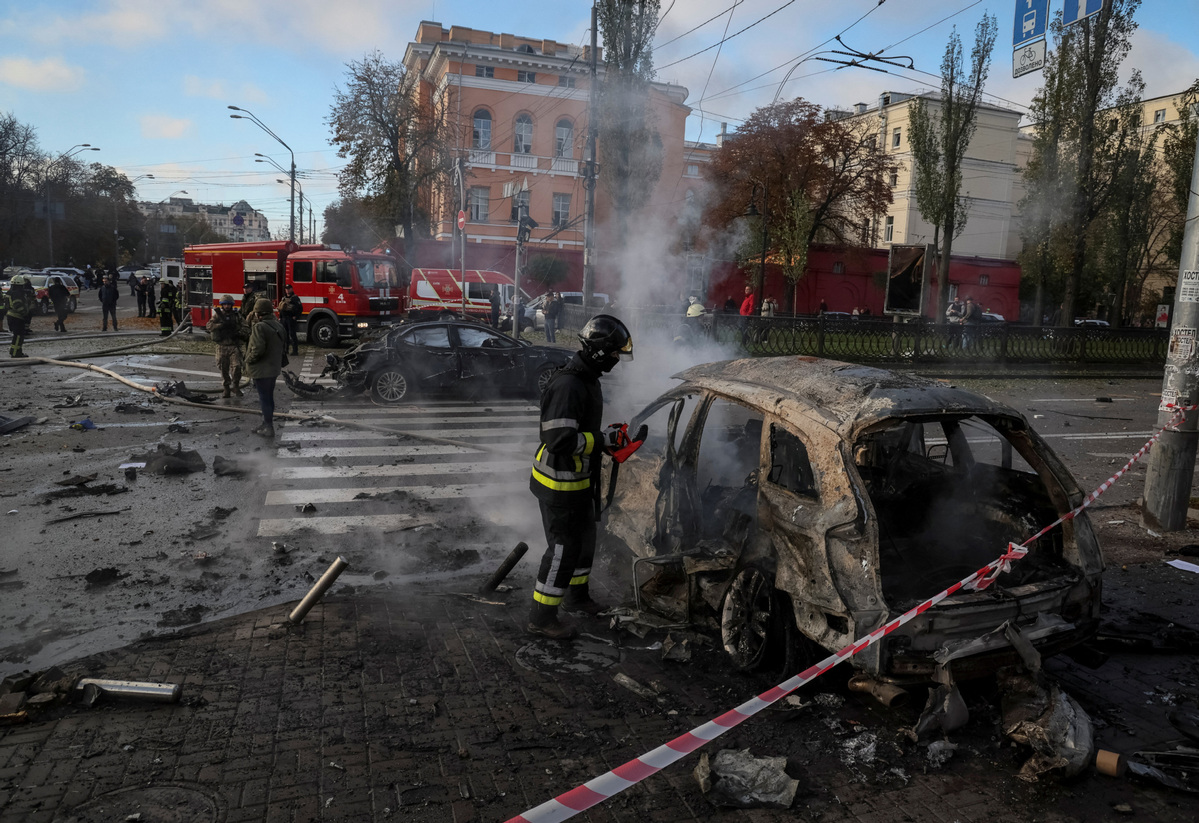
KYIV -- Several explosions occurred in the Shevchenkivskyi district here in Ukraine's capital on Monday morning, Kyiv Mayor Vitali Klitschko told The Telegram.
The explosions have resulted in casualties, according to the press service of the State Emergency Service in Kyiv.
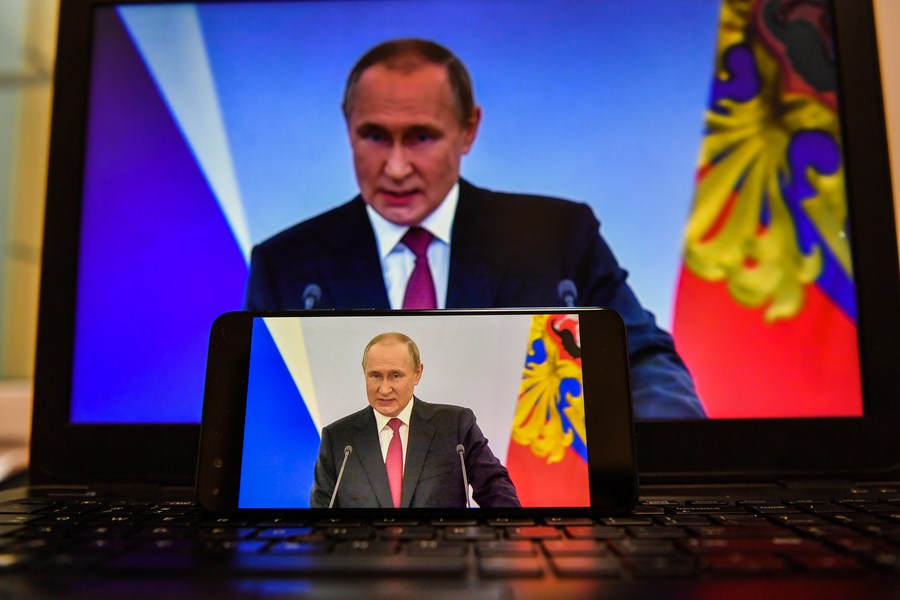
MOSCOW -- The explosion on the Crimean Bridge was no doubt a terrorist act aimed at destroying Russia's critical civilian infrastructure, Russian President Vladimir Putin said Sunday.
"Ukraine's special services were the initiators, performers and masterminds," Putin said when meeting with Chairman of the Russian Investigative Committee Alexander Bastrykin.
Confirming Putin's statement, Bastrykin said that citizens of Russia and foreign countries were also involved in the incident.
"We have already established the route of the truck which exploded. It drove through Bulgaria, Georgia, Armenia, North Ossetia, and the Krasnodar Territory," Bastrykin said.
"We have also identified the carriers ... With the help of FSB (Federal Security Service) agents, we were able to identify suspects from among those who could have arranged the terrorist act and those who are active within the Russian Federation," he added.
On Saturday, a deadly blast hit the 19-km Crimean Bridge, which consists of two parallel routes for automobiles and trains over the Kerch Strait.
A truck exploded on the road bridge, causing seven fuel tanks of a train heading to the Crimean Peninsula to catch fire. Three people were killed in the blast, which also led to the partial collapse of two spans of the road bridge.
The incident on the Crimean Bridge was a special operation carried out by the Security Service of Ukraine (SSU), the Interfax-Ukraine news agency cited its source in Ukraine's law enforcement agencies as saying. The SSU hasn't commented on the incident yet.
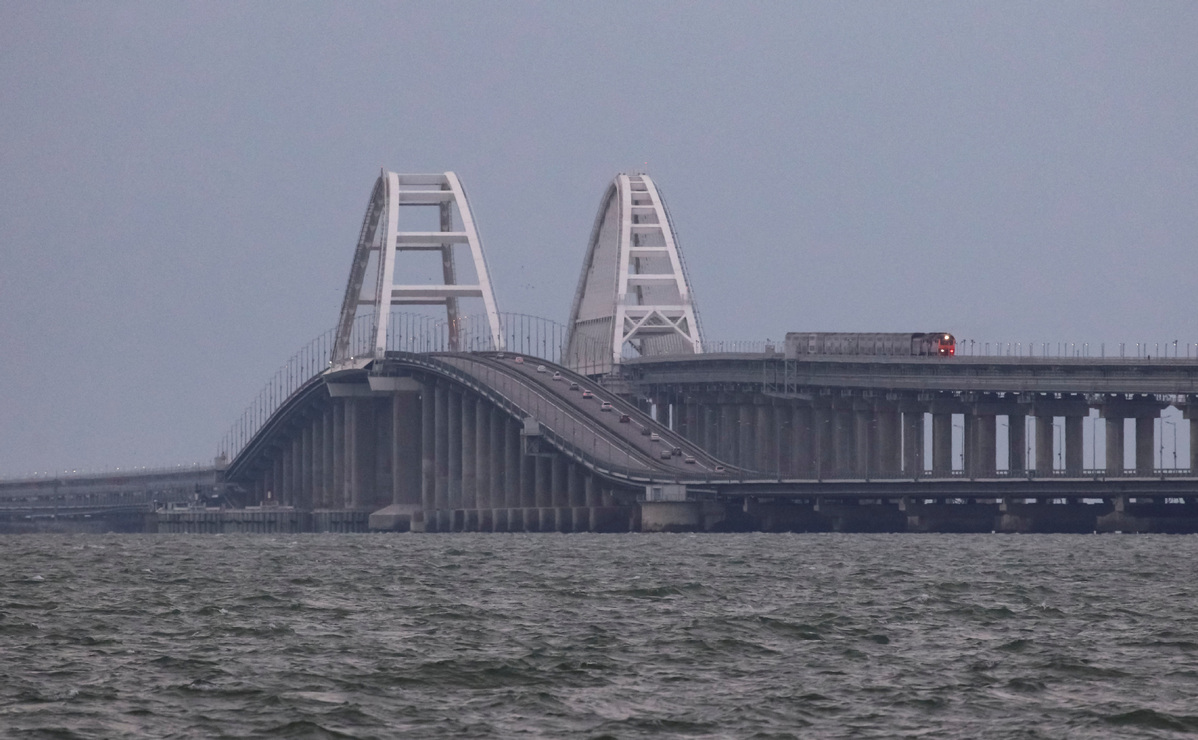
Russian investigation continues into cause as consequences are examined
A bridge linking Crimea to the southern Krasnodar region of Russia reopened to car traffic late on Saturday after it was heavily damaged by an explosion, and a government committee was established to investigate the cause, officials said.
The railway service on the bridge had been fully restored and all scheduled trains, both for passengers and freight, would be able to cross the viaduct, Russia's Deputy Prime Minister Marat Khusnullin said late on Saturday.
Three people died in the explosion, and the owner of a truck involved had been identified, investigators said.
Russia's President Vladimir Putin ordered a government committee to be set up to establish the cause of the explosion and deal with its consequences.
"A truck coming from the Taman Peninsula exploded on the road part of the Crimean Bridge at 6:07 am today, causing seven fuel tanks of a train heading to the Crimean Peninsula to catch fire," Russia's National Anti-Terrorism Committee said. "Two spans of the road bridge partially collapsed."
The arch over the navigable part of the bridge was undamaged, the committee said, and navigation across the Kerch Strait was not disrupted, the Federal Agency for Sea and Inland Water Transport said.
Those who died in the explosion were likely to have been passengers of a car near the truck that exploded, investigators said. Bodies of two of the victims, a man and a woman, had been lifted out of the water.
Investigators said a resident of the Krasnodar region, whom it did not name, was the owner of the car.
Investigative actions have been launched at his place of residence, and the truck's route documentation was being studied.
On Sunday, China's Foreign Ministry spokeswoman Mao Ning said China has taken note of relevant reports.
The Kerch Strait ferry line, which connects the Crimean Peninsula and the Krasnodar region, has resumed cargo deliveries, the Russian Transport Ministry said.
Oleg Kryuchkov, an adviser to Crimea's governor, said there was enough fuel and food on the peninsula, and all logistics plans had been worked out.
Interfax-Ukraine news agency cited a source in Ukraine's law enforcement agencies as saying the explosion was a special operation carried out by Ukraine's security service.
Ukraine's reaction to the destruction of civilian infrastructure testified to its "terrorist nature", said Russian Foreign Ministry spokeswoman Maria Zakharova.
Security strengthened
On Saturday Putin ordered strengthened measures for protecting Kerch Strait transport.
Last week Russia reiterated that it must be part of investigations into leaks in the two Nord Stream gas pipelines under the Baltic Sea found late last month. Reuters has reported that a US Navy reconnaissance aircraft flew near the site of the ruptured Nord Stream 2 pipeline hours after damage appeared.
The P-8A Poseidon maritime patrol and reconnaissance aircraft, which had flown from Iceland, performed a pattern of regular racetrack-shaped circuits over Poland before breaking away toward the Baltic pipeline area, according to flight data.
The identity of the aircraft could not immediately be established because of the type of rotating identification code sometimes used by such planes, but when Reuters showed the US data it confirmed it was a US aircraft.
Polish, Swedish, Danish and German ministries of defense were not immediately available for comment. However, Poland's Prime Minister, Mateusz Morawiecki, said on Thursday that the pipeline burst was "most likely" the work of Russian special services, citing information from Western allies.
Russia has rejected any allegations of responsibility as "stupid", blaming the US and its allies instead.
Xinhua contributed to the story.
REN QI in Moscow
renqi@chinadaily.com.cn
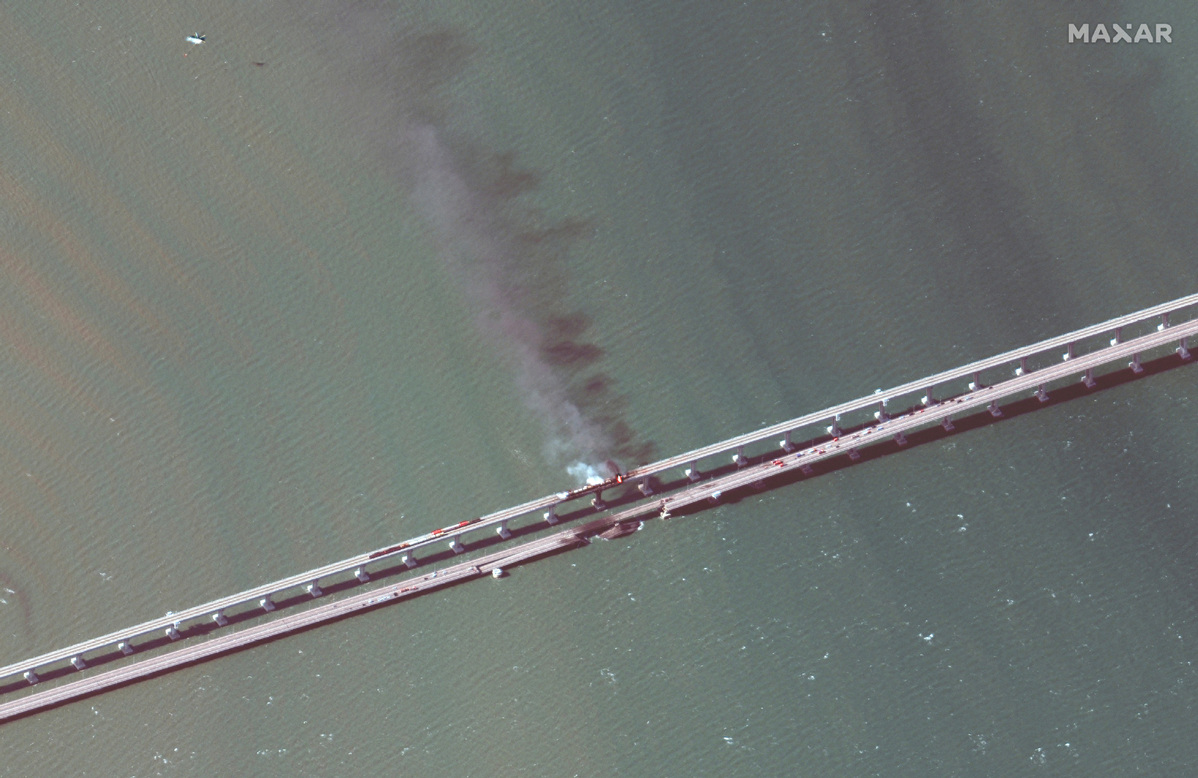
MOSCOW - Russian President Vladimir Putin signed a decree on Saturday to strengthen measures for protecting transport crossing through the Kerch Strait, the power grid connecting Crimea and the main gas pipeline to the peninsula.
Putin authorized the Russian Federal Security Service to organize and coordinate measures to effectively protect these facilities, said the decree published by the Kremlin.
Earlier on Saturday, a deadly blast hit the 19-km Crimean Bridge, which consists of two parallel routes for automobiles and trains over the Kerch Strait.
A truck exploded on the road bridge, causing seven fuel tanks of a train heading to the Crimean Peninsula to catch fire. Three people were killed in the blast, which also led to the partial collapse of two spans of the road bridge.
Traffic has reopened to cars and buses with a full inspection procedure needed, while trucks are still required to cross the Kerch Strait by ferry, Crimea's head Sergei Aksyonov said.
Meanwhile, the railway service on the bridge has been fully restored and all scheduled trains, both for passengers and freight, will be able to cross the viaduct, Russian Deputy Prime Minister Marat Khusnullin said on late Saturday.
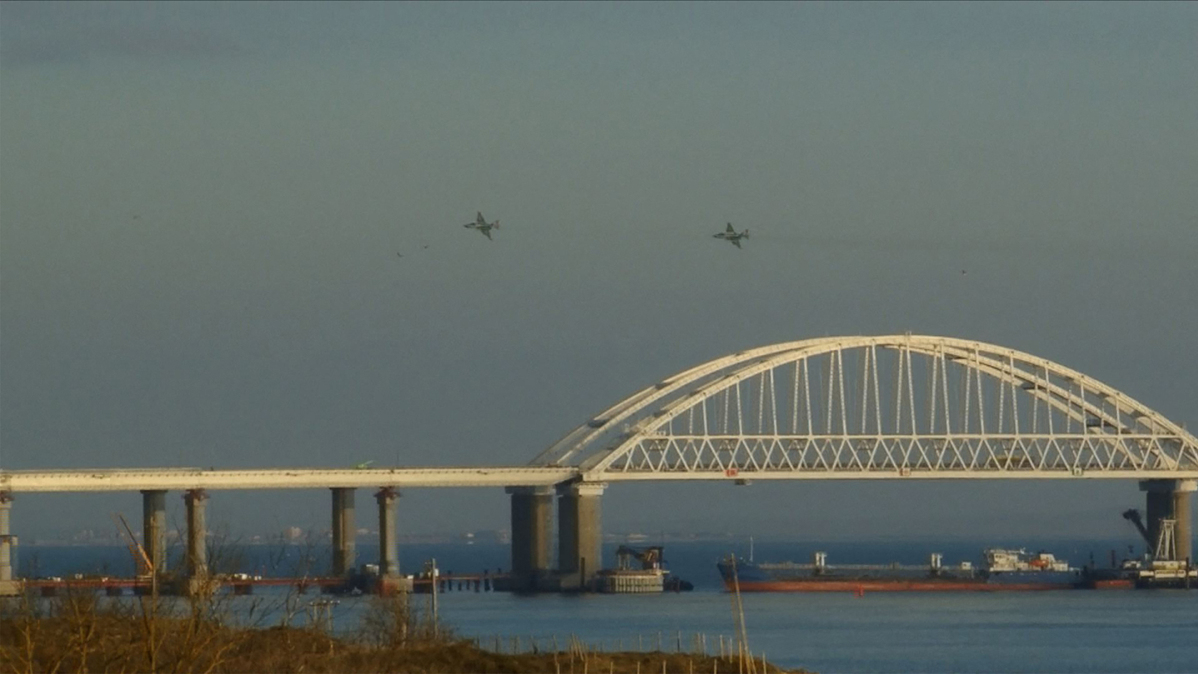
MOSCOW - Traffic reopened to cars and buses with a full inspection procedure needed on the road route of the Crimean Bridge, after an explosion on the viaduct on Saturday.
Trucks are still required to cross the Kerch Strait by ferry, Crimea's head Sergei Aksyonov said on Telegram.
Meanwhile, an initial assessment of the railway part of the Crimean Bridge has been carried out, and restoration work is underway, the Russian Ministry of Transport said.
The 19-km bridge, which consists of two parallel routes for automobiles and trains, will possibly open to trains by 8 pm Moscow time (1700 GMT) on Saturday, according to the ministry.
Earlier in the day, a truck exploded on the road bridge, causing seven fuel tanks of a train heading to the Crimean Peninsula to catch fire.
Three people were killed in the blast, which also led to the partial collapse of two spans of the road bridge.
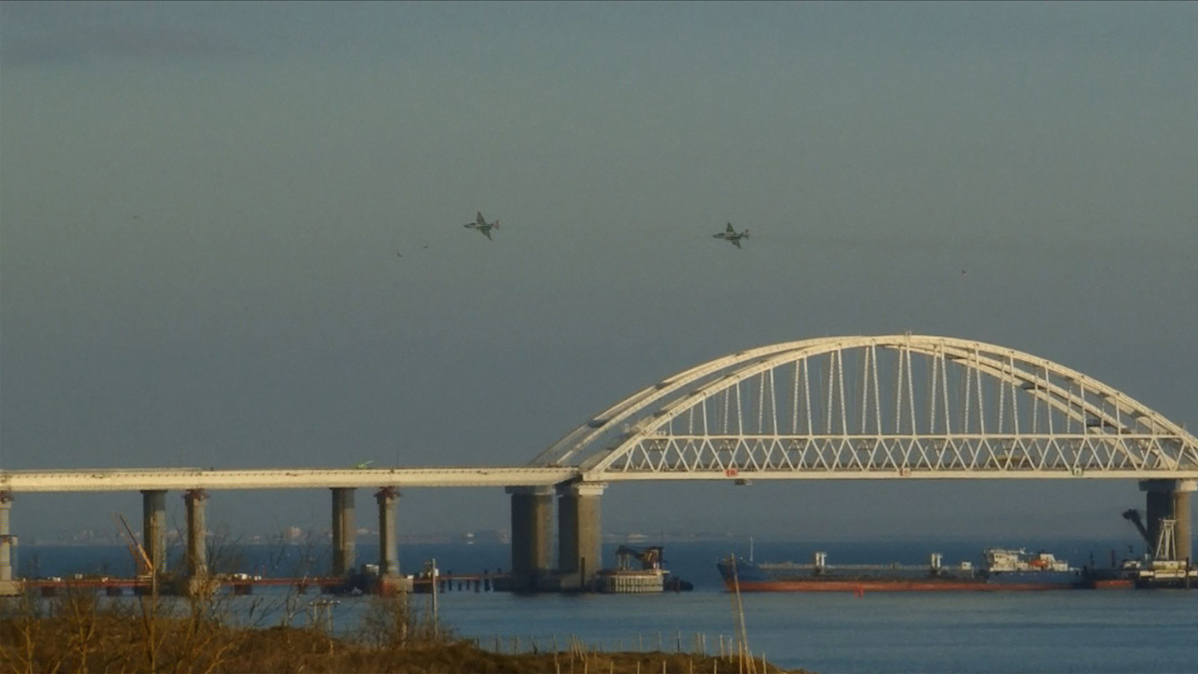
MOSCOW - Three people died in the explosion on the Crimean Bridge, which occurred Saturday morning, according to preliminary information from Russia's investigative committee into the incident.
Traffic is suspended on both the railway and road parts of the Crimean Bridge after a freight train caught fire while traveling on the viaduct over the Kerch Strait.
"A truck coming from the Taman Peninsula exploded on the road part of the Crimean Bridge at 6:07 am (0307 GMT) today, causing seven fuel tanks of a train heading to the Crimean Peninsula to catch fire. Two spans of the road bridge partially collapsed," Russia's National Anti-Terrorism Committee said in a statement.
Russian President Vladimir Putin ordered to form a government committee to establish the causes of the incident and quickly address its consequences.
The arch over the navigable part of the bridge was not damaged, the committee said. What's more, navigation across the Kerch Strait was not disrupted by the incident, according to Russia's Federal Agency for Sea and Inland Water Transport.
The Kerch Strait ferry line, which connects the Crimean Peninsula and south Russia's Krasnodar region, has resumed operation to deliver cargoes, the Russian Transport Ministry said.
Oleg Kryuchkov, an adviser to the head of Crimea, said there's enough fuel and food on the peninsula and all logistics plans have been worked out.
The incident on the Crimean Bridge was a special operation carried out by the Security Service of Ukraine (SSU), the Interfax-Ukraine news agency cited its source in Ukraine's law enforcement agencies as saying. The SSU hasn't commented on the incident yet.
Kiev's reaction to the destruction of civilian infrastructure testifies to its "terrorist nature," Russian Foreign Ministry spokesperson Maria Zakharova said on Telegram.
The 19-km bridge consists of two parallel routes for automobiles and trains.
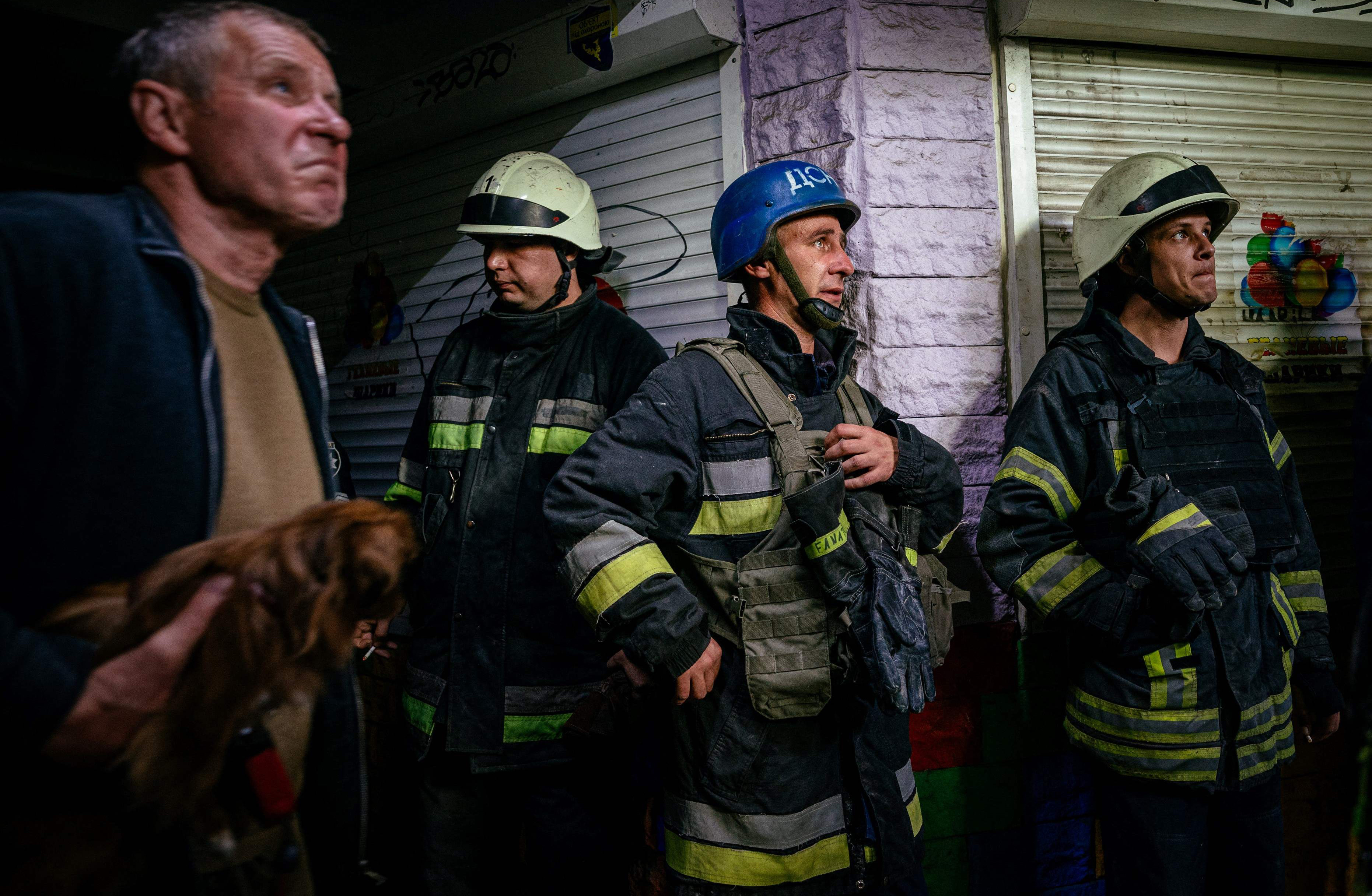
EU's 8th package of measures against Moscow includes price cap on crude oil
An eighth package of European Union sanctions against Russia that target the economy and individuals has taken effect, the Council of the European Union said on Thursday, with the measures including a price cap on oil imports and import bans worth 7 billion euros ($6.85 billion).
"The agreed package includes a series of biting measures intended to reinforce pressure on the Russian government and economy, weaken Russia's military capabilities," the Council said in a statement.
The measures include more restrictions in trade with Russia in steel and technology products, along with a price cap for Russian seaborne crude deliveries to third countries through European insurers in an action that is meant to align the bloc with the actions of the United States.
The oil cap was watered down to give exemptions to seafaring countries like Greece, Malta and Cyprus, EU diplomats said, with some doubting its practical feasibility or efficiency.
The sanctions were agreed by EU member states on Wednesday, and were officially formalized on Thursday as no EU countries raised last-minute objections.
"As concerns trade, the EU is extending the import ban on steel products that either originate in Russia or are exported from Russia," the statement said. "Further import restrictions are also imposed on wood pulp and paper, cigarettes, plastics and cosmetics as well as elements used in the jewelry industry such as stones and precious metals, that altogether generate significant revenues for Russia."
Former German chancellor Angela Merkel on Thursday said Europe can achieve a lasting peace only with the involvement of Russia. Otherwise the Cold War would continue, she was reported by the DPA news service as saying.
Russian President Vladimir Putin on Thursday demanded economic measures in response to Western sanctions.
"It is important to understand that the sanctions pressure on Russia will only increase," Putin said at a government meeting on economic issues via video link.
Putin asked the government and the central bank to ensure a sustainable recovery of macroeconomic indicators.
Export-oriented sectors remain under pressure, primarily those targeting European countries, and it takes time for Russian exporters to switch to other markets, he noted.
Meanwhile, Putin pointed out some positive trends, as industrial production had returned to the level of the previous year.
The worst-hit industries, such as the automotive industry and metallurgy, are gradually recovering and agriculture also shows good dynamics, he said.
Also on Thursday, Ukrainian President Volodymyr Zelensky met with visiting International Atomic Energy Agency Director-General Rafael Grossi to discuss the situation at the Zaporizhzhia nuclear power plant.
During the talks, Zelensky and Grossi talked about the IAEA mission to the nuclear plant and Putin's decree on Wednesday that designates the plant as Russian "federal property".
The Ukrainian leader also stressed the need for the resumption of the plant's operation for the energy security of Ukraine and Europe.
Xinhua contributed to the story.
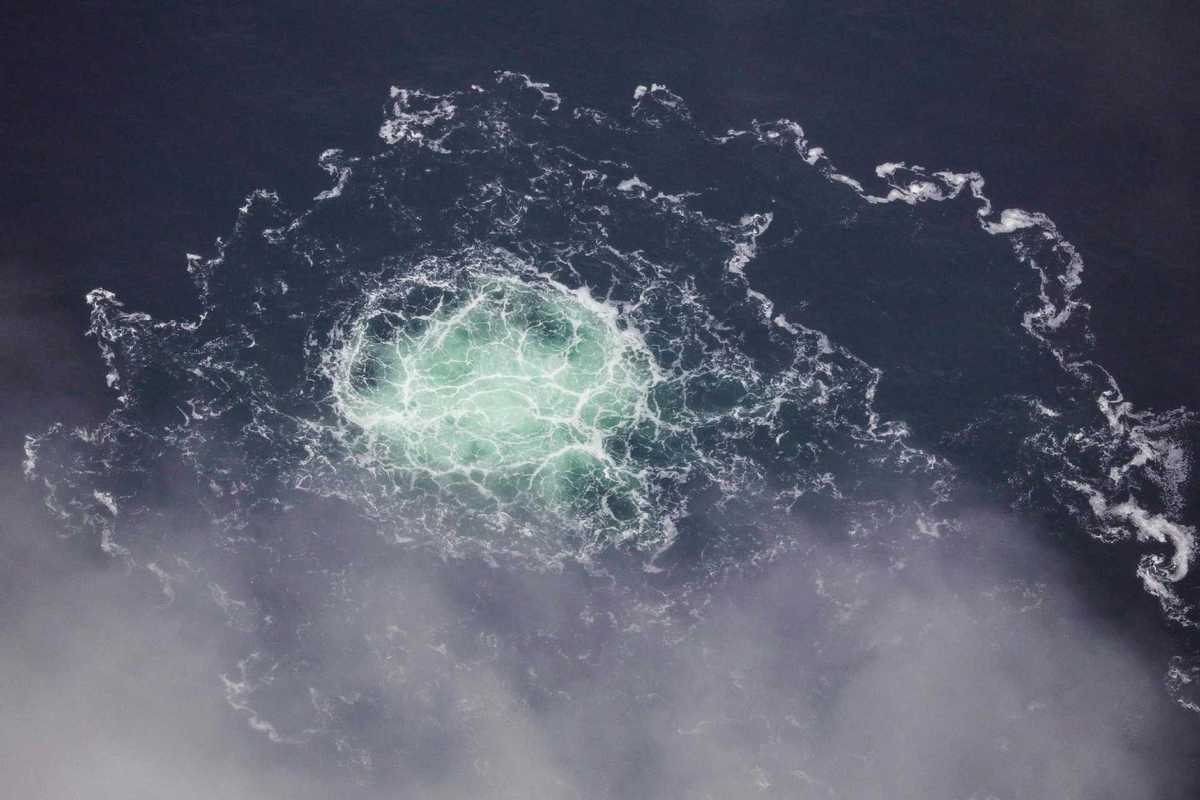
MOSCOW — Russia said on Wednesday it was ready to quickly supply gas to Europe through an undamaged section of the Nord Stream 2 pipeline between Russia and Germany, after recent leaks heightened geopolitical tensions.
Russian Deputy Prime Minister Alexander Novak said Russia is ready to supply gas to Europe via one line of Nord Stream 2 if necessary. Construction of the pipeline was completed last September, but was abandoned by Germany just days before the outbreak of the Russia-Ukraine conflict on Feb 24.
Novak told Russian state television that Russia must take part in investigations into last week's explosions of the two Nord Stream gas pipelines under the Baltic Sea. One line of Nord Stream 2 was left unscathed by the incidents.
He said Russia may cut oil production in order to offset negative effects from price caps imposed by the West.
The price cap plan agreed by G7 wealthy nations calls for participating countries to deny insurance, finance, brokering, navigation and other services to oil cargoes priced above a yet-to-be-determined price cap on crude and oil products.
"Such a tool disrupts all market mechanisms and can have a very detrimental effect on the global oil industry," Novak said.
He also said Russian companies would "not supply oil to those countries" that introduce such a cap.
The European Union is looking at an oil price cap to match the one agreed by the G7, diplomats said last month.
Novak was also cited by TASS news agency as saying that Russia will produce 530 million metric tons of oil, or 10.6 million barrels per day, this year and 490 million tons next year.
Europe may face an even more acute energy crunch next year after draining its natural gas tanks to get through the cold of this winter, Fatih Birol, executive director of the Paris-based International Energy Agency, said on Wednesday.
Agencies Via Xinhua
MOSCOW -- Russian President Vladimir Putin signed federal laws Wednesday formalizing the accession of Donetsk, Lugansk, Zaporizhzhia and Kherson.
Putin also signed federal constitutional laws on forming new regions within Russia.
The relevant documents have been published on the country's official legal information portal.
Russia's upper house of parliament, the Federation Council, and the lower house of parliament, the State Duma, ratified accession treaties earlier this week.
On Friday, the Kremlin held a treaty signing ceremony to incorporate Donetsk, Lugansk, Zaporizhzhia and Kherson into the Russian Federation.
PRAGUE -- Prague, the capital of the Czech Republic that currently holds the rotating Presidency of the Council of the European Union (EU), will host an informal EU summit later this week.
On Friday, the leaders of the EU member states are set to discuss the Russia-Ukraine conflict, the rising costs of energy and its economic ramifications -- the three most pressing issues facing the bloc. On Thursday, the summit will be preceded by the inaugural meeting of the European Political Community (EPC).
EU+ GATHERING
The brainchild of French President Emmanuel Macron, the EPC serves as a platform for political coordination for European countries. It aims to promote political dialogue and cooperation on issues of common interest to strengthen the continent's security and stability.
The EPC meeting in Prague, the first of its kind, will bring together leaders of over 40 European countries. Besides the 27 EU member states, several Western Balkan nations, Ukraine, Moldova, Georgia and non-EU countries that are deeply integrated in the single market -- such as Norway and Switzerland -- as well as the United Kingdom (UK) and Turkey have been invited to the so-called "EU+" gathering.
UK Prime Minister Liz Truss is reported to have decided to attend the meeting, as it gives her country "an opportunity to shape a new European forum from the inside after Brexit." London has also suggested hosting one of the next EPC meetings.
Turkish President Recep Tayyip Erdogan will also join the meeting, Czech media reported, citing the Turkish ambassador to the Czech Republic. Greece has said it is open to a meeting between Prime Minister Kyriakos Mitsotakis and Erdogan in Prague amid a recent escalation of tensions between the two neighbors over their disputes in the Aegean Sea.
According to the Czech EU Council Presidency, the participants will discuss security and peace, energy, climate and economy. They are also expected to debate the platform's future settings, including the frequency of meetings and the host countries. However, the EU has said that "no formal written outcome of the EPC is envisaged."
ENERGY SECURITY
The Russia-Ukraine conflict has had a "dramatic impact" on the energy situation in Europe, with a spillover effect on the economy, according to European Council President Charles Michel.
"Our primary objective is to ensure that we guarantee security of supply and affordable energy for our households and businesses, particularly as the winter cold approaches," he said. "We will assess the decisions already taken in this regard and give guidance on further action needed to ensure a well-coordinated European response."
Last week, the EU member states' energy ministers reached a political agreement on a series of emergency measures, including reducing electricity use and capping the revenues of electricity producers, in a bid to mitigate the current high energy prices. However, the member states remain divided on capping natural gas prices.
EU leaders will also examine ways to protect their countries' critical infrastructure. Several leaks have been detected recently on the Nord Stream 1 and 2 gas pipelines in the Baltic Sea near Denmark and Sweden, an incident reportedly being investigated as probable sabotage.
Describing the incidents as a "threat to the EU," Michel tweeted that "We are determined to secure our critical infrastructure. Leaders will address this at the upcoming summit in Prague."
The leaders will also discuss the overall economic situation. Inflation in the eurozone rose by 10 percent in September, a new record high since the launch of the single currency in 1999. Energy prices, which rose by 40.8 percent in September from a year ago, were once again the main contributor to accelerating inflation.
NEW SANCTIONS
In his invitation letter to EU member states for the Prague summit, Michel said the leaders will discuss ways to continue providing "strong economic, military, political and financial support" to Ukraine, while strengthening "our restrictive measures to further increase pressure on Russia."
The European Commission, the EU's executive arm, last week proposed the eighth round of sanctions against Russia. The proposed sanctions package will further restrict trade to "isolate and hit Russia's economy even more," and includes additional export bans on key technologies used for the military.
The EU countries are reportedly getting close to agreeing on the package, which is expected to be approved this week.
In the EU, sanctions decisions require unanimity, and among the member states the government of Hungary has been a vocal opponent of sanctions against Russia.
Hungary's Prime Minister Viktor Orban said late last month that with the sanctions, Europe has "shot itself in the foot."
"European people have become poorer (because of the sanctions), while Russia has not fallen to its knees," he argued, adding that families across Europe were paying the price of the sanctions in their energy bills.
In Prague, two demonstrations were held in September against the Czech government's handling of the energy crisis, calling for, among others, the country's military neutrality and direct contracts with gas suppliers -- primarily with Russia -- to alleviate the burden of high energy prices.

KYIV -- Ukrainian President Volodymyr Zelensky signed a decree to put into effect the decision of the National Security and Defense Council (NSDC), which rules out holding any negotiations with Russian President Vladimir Putin, Zelensky's press service reported Tuesday.
The document, published on Zelensky's website, said that Ukraine's NSDC deemed holding talks with Putin "impossible."
With his decree, Zelensky also instructed the government to prepare proposals for the creation of a multi-level security guarantee system designed to boost Ukraine's defense potential.
On Sept 30, the NSDC adopted a decision aimed at guaranteeing Ukraine's security and restoring its territorial integrity following Moscow's formal recognition of four Ukrainian regions, which are partially controlled by Russia, as Russian territory.
Ukrainian and Russian negotiators held the latest round of face-to-face peace talks in Istanbul, Türkiye, on March 29.
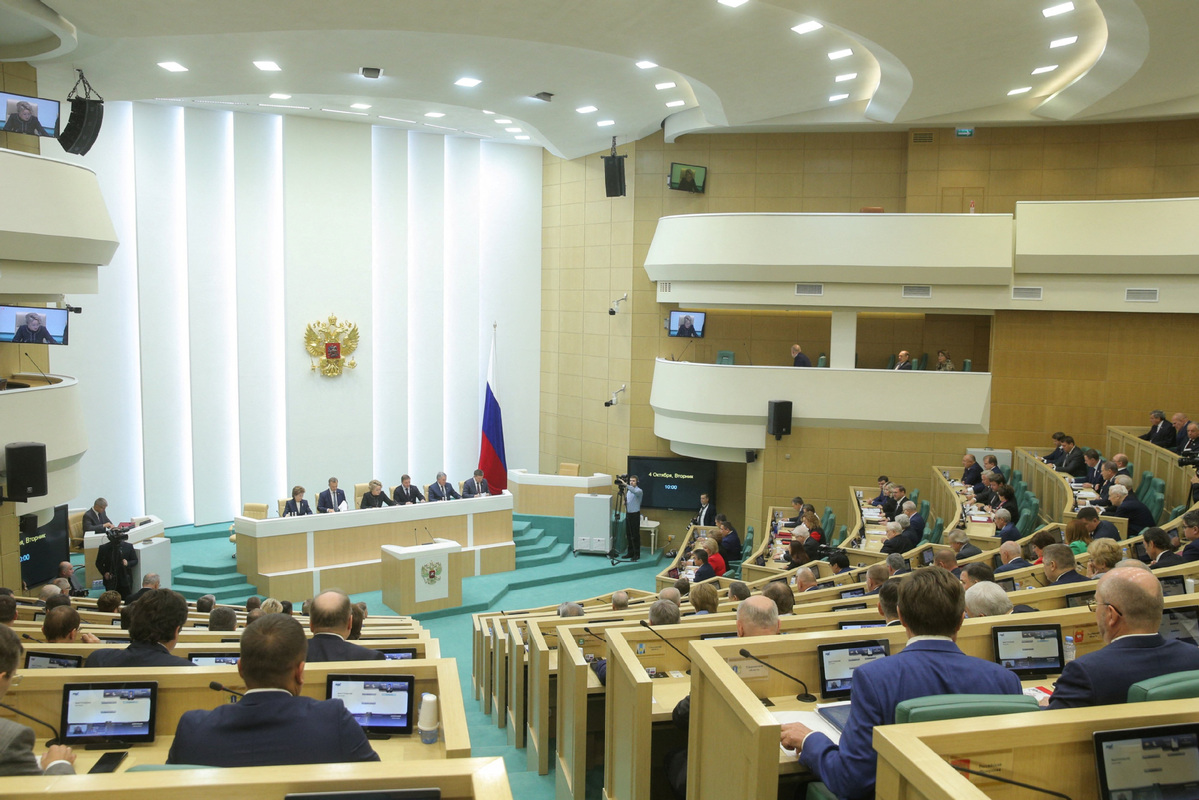
MOSCOW -- Russia's upper house of parliament, the Federation Council, on Tuesday ratified agreements on the accession of Donetsk, Lugansk, Zaporizhzhia and Kherson to Russia.
The Senate lawmakers unanimously voted in favor of the legislation at a plenary session.
On Monday, Russia's lower house of parliament, the State Duma, ratified the treaties.
A ceremony was held on Friday in the Kremlin for the signing of treaties to incorporate Donetsk, Lugansk, Zaporizhzhia and Kherson into the Russian Federation.

MOSCOW - Russia's lower house of parliament, the State Duma, ratified agreements on the accession of Donetsk, Lugansk, Zaporizhzhia and Kherson to Russia, it said on Monday in a statement.
Members of the State Duma unanimously voted in favor of the legislation.
The accession to Russia is a way to protect the rights of the people living in these territories, Chairman of the Russian State Duma Vyacheslav Volodin said in a Telegram post following the vote.
He stressed that "the goals and objectives of the special military operation have been defined, they will be achieved without fail".
A ceremony was held on Friday for the signing of treaties to incorporate Donetsk, Lugansk, Zaporizhzhia and Kherson into the Russian Federation.
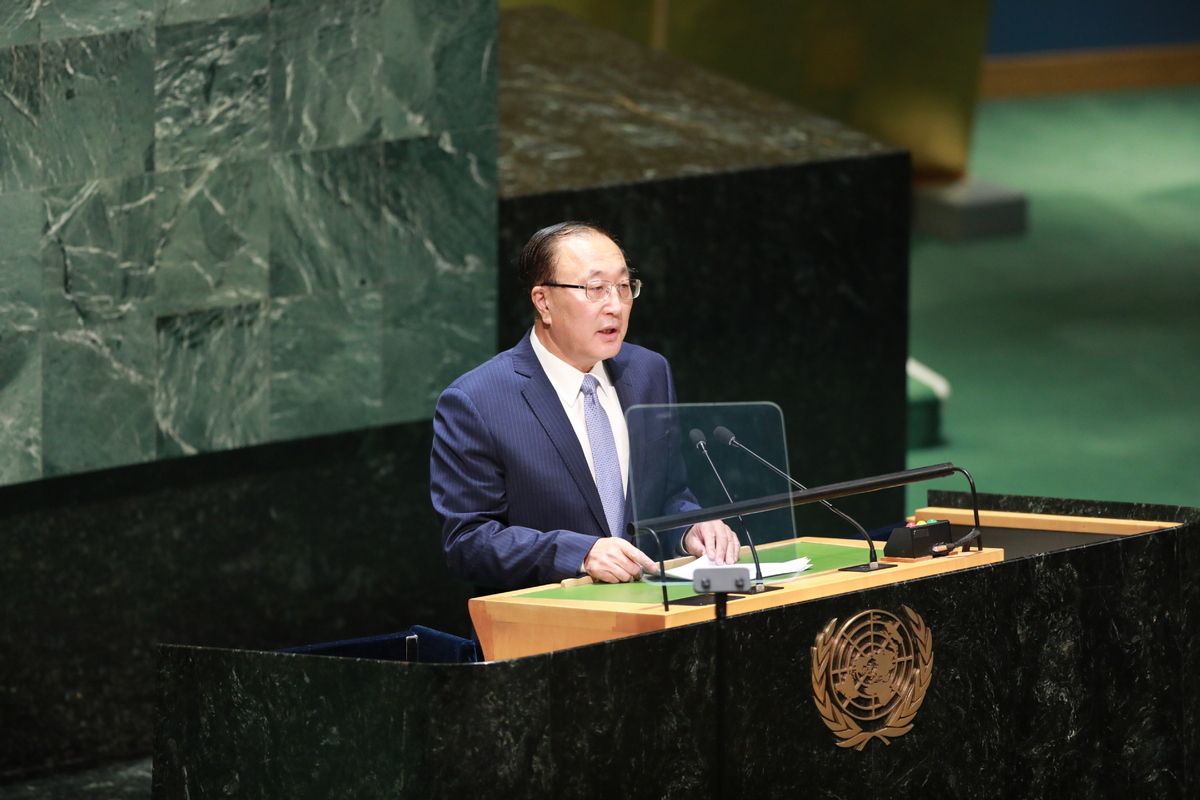
UNITED NATIONS - China on Friday urged all sides to leave space for diplomatic negotiations in efforts to resolve the Ukraine crisis.
"China calls on all parties concerned to exercise restraint, refrain from actions that exacerbate tensions, and leave space for settlement through diplomatic negotiations," Zhang Jun, China's permanent representative to the United Nations, said in his explanation of China's vote on a Security Council draft resolution on Ukraine.
The draft resolution, put forward by Albania and the United States, failed to pass in the Security Council as it was vetoed by Russia. China, India, Brazil and Gabon abstained from the voting.
China's position on the issue of Ukraine is "consistent and clear." The sovereignty and territorial integrity of all countries should be safeguarded, the purposes and principles of the UN Charter should be observed, the legitimate security concerns of all parties should be taken seriously, and all actors conducive to the peaceful resolution of the crisis should be supported, Zhang said.
China believes that "the pressing priority is to make every effort to de-escalate the situation, and guide the parties to restart diplomatic negotiations as soon as possible to open the door to a political settlement with legitimate concerns brought into the negotiations and the viable options on the table, in an effort to achieve an early ceasefire," said the ambassador.
Zhang said that the current crisis in Ukraine is a result of the accumulation and interplay of various problems and tensions over a long period of time. "Facts have shown that political isolation, sanctions and pressurization fuel the tensions, and bloc confrontation will not bring peace. Instead, they will only worsen the situation, and make the issue more complicated and intractable."
"As a responsible country, China has always stood on the side of peace. We will continue to play a constructive role in easing the situation and resolving the crisis," said the ambassador.
At incorporation ceremony, Putin accuses West of 'blasts' causing gas pipeline leaks
MOSCOW/STOCKHOLM — Russian President Vladimir Putin has signed treaties incorporating four regions into Russia amid widespread concerns of Nord Stream pipeline leaks.
At a ceremony in the Kremlin's opulent white-and-gold St George's Hall on Friday, Putin and the heads of the four regions put their names on treaties for them to join Russia.
The signing came three days after the completion of the referendums held in the four regions — Donetsk, Lugansk, Kherson and Zaporizhzhia — on joining Russia.
Both houses of the parliament will meet next week to ratify the treaties for the regions to join Russia, sending them to Putin for his approval.
At the ceremony, Putin also directly accused the United States and its allies of blowing up the Nord Stream pipelines.
"The sanctions were not enough for the Anglo-Saxons: they moved onto sabotage," Putin said. "It is hard to believe but it is a fact that they organized the blasts on the Nord Stream international gas pipelines.
"They began to destroy the pan-European energy infrastructure," Putin said. "It is clear to everyone who benefits from this. Of course, he who benefits did it."
This statement comes as a fourth leak was detected on undersea pipelines linking Russia to Europe on Thursday.
The leak was discovered on the Nord Stream 2 pipeline in Sweden's exclusive economic zone near a previously reported hole on Nord Stream 1.
The Swedish Coast Guard said the leak on Nord Stream 2 was discovered earlier in the week, but the first media reports about this only emerged on Wednesday evening.
The pipelines were constructed to transport natural gas from Russia to Germany, though neither was in use when the leaks were discovered.
On the ongoing investigations to determine the origin of the damage, Russia's Foreign Intelligence Service said on Friday that Moscow had material that indicated the West had a role in ruptures to the undersea pipelines, which have threatened to put them permanently out of use, Russian news agencies reported.
"We have material that points to a Western trace in the organization and implementation of these terrorist acts," Sergey Naryshkin, head of the agency, was quoted by the Interfax news agency as saying.
Swedish Energy Minister Khashayar Farmanbar also said on Friday that the leaks are very likely the result of state action.
"It's very likely that it has been done deliberately and not by accident, and it's very unlikely it's been done by anybody else than a state without being detected earlier," Farmanbar told reporters before a meeting of European Union ministers in Brussels.
Earlier on Thursday, United States Defense Secretary Lloyd Austin said it was still too soon to speculate who might have been behind the ruptures.
NATO declared the damage was the result of "deliberate, reckless and irresponsible acts of sabotage" and said it supported investigations to determine the origin of the damage.
The Nord Stream 1 and 2 pipelines have been at the center of the ongoing Russia-Ukraine crisis.
Besides geopolitical tensions, scientists also warn against significant detrimental impacts on the climate from the gas leaks.
"From what I have seen, this is an unprecedented loss to the atmosphere of fossil methane in a very short time from a concentrated source," said Marcia McNutt, president of the US National Academy of Sciences.
Xinhua
MOSCOW - A ceremony was held on Friday for the signing of treaties to incorporate Donetsk, Lugansk, Zaporizhzhia and Kherson into the Russian Federation.
Russian President Vladimir Putin participated in the event, which took place in the Kremlin.
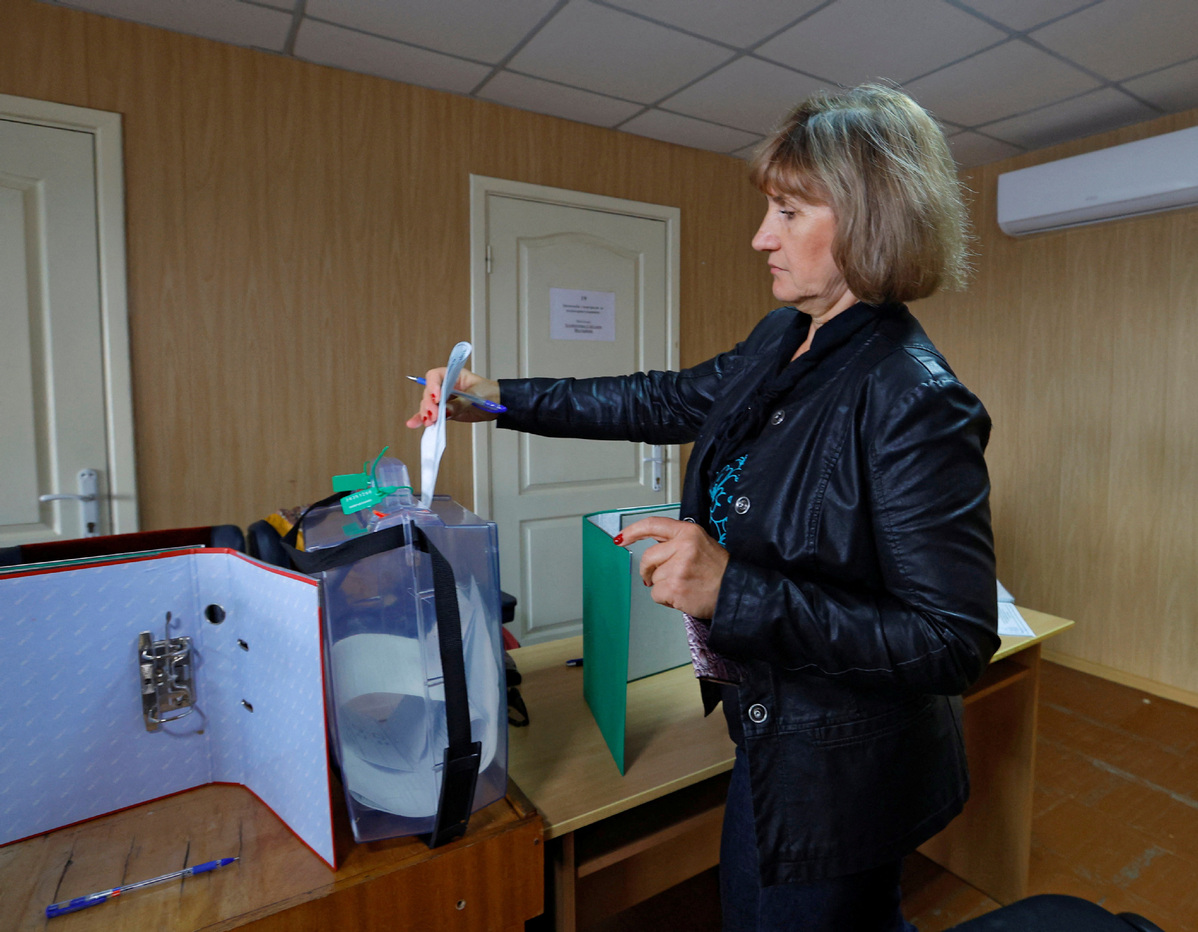
MOSCOW/KYIV — The Kremlin on Tuesday announced the results of referendums held in four regions to determine whether they want to become part of Russia.
Authorities in Zaporizhzhia said 93.11 percent of voters backed joining Russia, according to preliminary results on Tuesday evening.
In Kherson, officials said more than 87.05 percent of electors supported the move after all the ballots were counted.
In the eastern Lugansk region, local authorities said more than 98.42 percent voted in favor of the incorporation, according to local authorities. And officials in the Donetsk region claimed victory as well, with the local poll body saying 99.23 percent of the vote was for incorporation.
"Saving people in the territories where this referendum is taking place … is the focus of the attention of our entire society and of the entire country," Russian President Vladimir Putin said earlier during a televised meeting with officials.
Putin is expected to address the parliament about the referendums on Friday, and Valentina Matviyenko, who chairs the body's upper house, said lawmakers could consider legislation of incorporation on Oct 4.
Kremlin spokesman Dmitry Peskov said the votes would have "radical" legal implications and that the referendums "will also have consequences for security".
The referendums in the Lugansk and Kherson regions and parts of Donetsk and Zaporizhzhia began on Friday.
The ballots asked residents whether they wanted the areas to be incorporated into Russia.
Ukrainian President Volodymyr Zelensky denounced Russia's just-concluded referendums and ruled out any talks with Moscow as long as Putin remains president.
He also called for Russia's "complete isolation" and tough new global sanctions.
Speaking to the UN Security Council by video over Russian objections, Zelensky urged additional military and financial support to defend Ukraine "so the aggressor would lose", and "clear and legally binding guarantees of collective security" for his country.
MOSCOW - The US delegation in Geneva has admitted that Washington had been conducting biological research on low-income citizens from Ukraine at a meeting of the states parties to the Biological and Toxin Weapons Convention, Russia's Sputnik news agency has reported.
"US and Ukrainian explanations regarding the export of strains and biomaterial belongings to Ukrainian citizens, and their adherence to ethical standards when conducting research on military personnel, low-income citizens, as well as ... patients in psychiatric hospitals, looked extremely unconvincing," Igor Kirillov, chief of the Radiation, Chemical and Biological Defense Forces of the Russian Armed Forces, was quoted by the media as saying.
Kirillov said Washington admitted to carrying out the research, noting that the transfer of pathogenic biomaterials to the United States was not done frequently.
